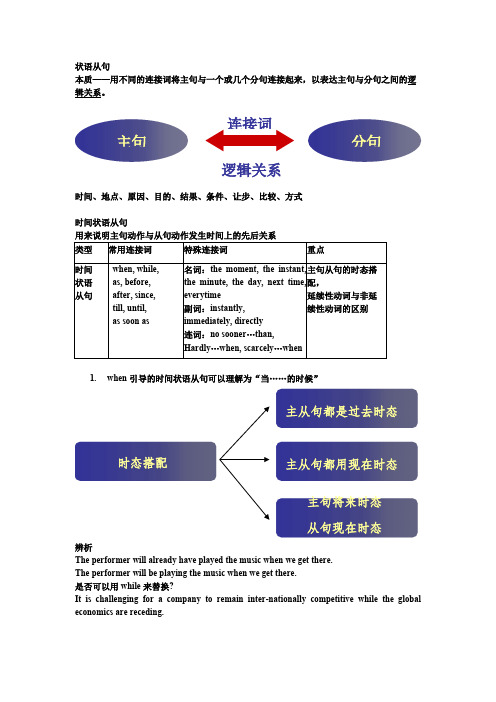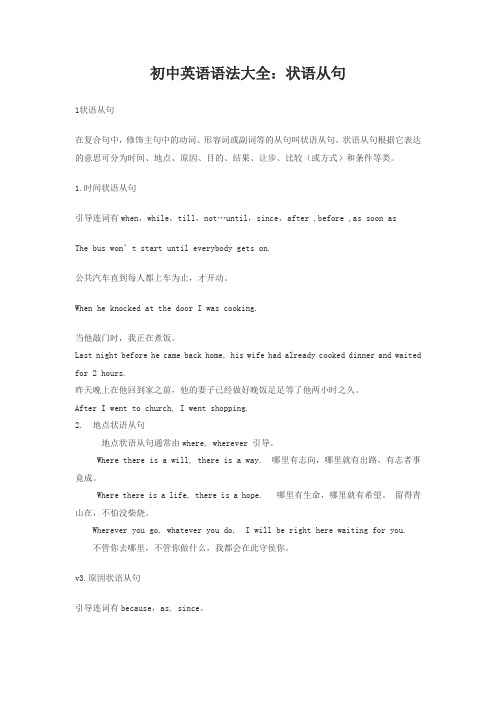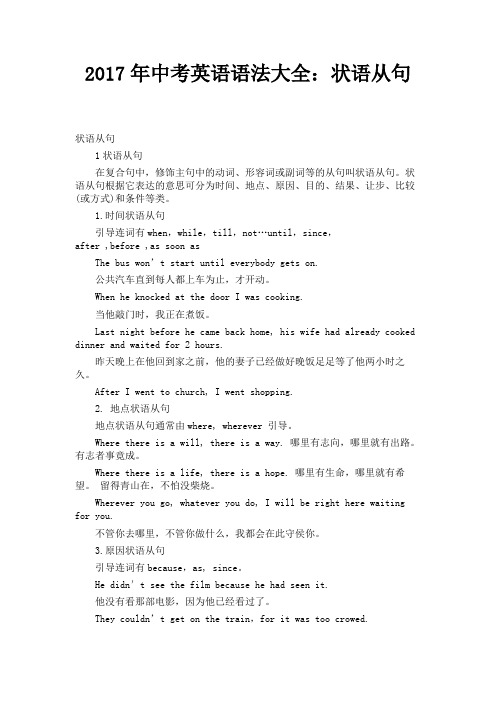状语从句9种全
(完整版)状语从句的讲解最全的状语从句讲解

状语从句的讲解就是用一句话作状语分为:时间,地点,方式,原因,结果,条件,让步,目的,比较一、时间状语从句第一次见到你一见到你我就喜欢上了你直到见到你五岁时见到你When, as, while, before, after, since, till/until, as soon as no sooner…than…scarcely…when…hardly…when… the minute the second the instant the moment by the time 截止 immediately instantly directlyeach time every time next time the first time on doing sthwhenwhile 当…时as1。
when 1)当…时/ 延续性动词短暂性动词都可用2)这时/3)届时、到时I was watching TV when my cellphone suddenly rang这时When I was five years old I could speak five languagesThe wet weather will continue tommorow when a cold front is expected to arrive届时到时注意:时间状语从句中动作发生有前后时先发生的用过去完成时When my mother came back I had already gone to bed.2。
while 1)从句动词延续性2)同时发生3)对比的意味“然而”4)趁着He taught himself while he worked in a bank 延续性动词当他在银行上班时While we were working they were having a rest.对比While they were having a discussion , they got very confused。
从句9种全

从句9种全从句是指在复合句中作为独立成分的句子。
根据从句的功能和结构,可以将从句分为多个类型。
本文将介绍完整版从句的九种常见类型,包括:1. 名词性从句:名词性从句可以充当主语、宾语、表语或同位语。
例如:“他说他会来”中的“他会来”是一个宾语从句。
2. 定语从句:定语从句用来修饰名词或代词。
它通常放在被修饰的名词或代词之后。
例如:“我喜欢的书是你给我的那本”中的“你给我的那本”是一个定语从句。
3. 状语从句:状语从句用来修饰动词、形容词或副词,表达时间、地点、原因、条件等信息。
例如:“因为下雨,我没有去游泳”中的“因为下雨”是一个状语从句。
4. 同位语从句:同位语从句用来解释或说明名词的具体内容或性质。
例如:“我听说他被任命为经理”中的“他被任命为经理”是一个同位语从句。
5. 结果从句:结果从句用来表达某个行动或情况的结果。
例如:“她太累,以致于睡着了”中的“以致于睡着了”是一个结果从句。
6. 条件从句:条件从句用来表示某个条件下可能发生的情况。
例如:“如果明天下雨,我们就不去郊游了”中的“如果明天下雨”是一个条件从句。
7. 原因从句:原因从句用来说明某个行动或情况的原因。
例如:“他失败是因为他不努力”中的“因为他不努力”是一个原因从句。
8. 目的从句:目的从句用来表达某个行动或情况的目的。
例如:“我来找你是为了向你道歉”中的“为了向你道歉”是一个目的从句。
9. 让步从句:让步从句用来表示与主句意思相反的情况。
例如:“尽管下雨了,他还是去了”中的“尽管下雨了”是一个让步从句。
以上就是完整版从句的九种类型,希望对您的写作有所帮助。
状语从句大全

Unit4----unit6语法复习Adverbial Clause(状语从句)1状语从句的种类用来修饰谓语动词、其它动词、定语、状语或整个句子的从句叫做状语从句。
状语从句可分为: 1.时间状语从句;(adverbial clause of time) 2.地点状语从句;(adverbial clause of place) 3.原因状语从句;(adverbial clause of cause) 4.条件状语从句;(adverbial clause of condition) 5.目的状语从句;(adverbial clause of purpose) 6.让步状语从句;(adverbial clause of concession) 7.比较状语从句;(adverbial clause of comparison) 8.程度状语从句;(adverbial clause of degree) 9.方式状语从句;(adverbial clause of manner) 10.结果状语从句。
(adverbial clause of result) 2状语从句的时态特点一般情况下,时间和条件状语从句的谓语动词一般用“一般现在时”表示“一般将来时”,用“现在完成时”表示“将来完成时”。
例如: I will call you as soon as I arrive in Beijing. 我一到北京就给你打电话。
(这是由as soon as引导的时间状语从句,从句中的谓语动词arrive 是一般现在时,表示一般将来时,决不可用will arrive) As soon as I have finished this work, I will go home. 我一完成此工作,就回家。
(从句中的谓语动词用现在完成时have finished,表示将来完成时,决不可用will have finished) If he comes back, please let me know.如果他回来了,请通知我。
状语从句(原因,目的,时间,地点)

状语从句本质——用不同的连接词将主句与一个或几个分句连接起来,以表达主句与分句之间的逻辑关系。
主句分句连接词逻辑关系时间、地点、原因、目的、结果、条件、让步、比较、方式时间状语从句用来说明主句动作与从句动作发生时间上的先后关系类型常用连接词特殊连接词重点时间状语从句when, while, as, before,after, since, till, until,as soon as 名词:the moment, theinstant, the minute, theday, next time, everytime副词:instantly,immediately, directly 连词:no sooner …than,Hardly…when, scarcely …when 主句从句的时态搭配,延续性动词与非延续性动词的区别1. when 引导的时间状语从句可以理解为“当……的时候”时态搭配主从句都是过去时态主从句都用现在时态主句将来时态从句现在时态辨析The performer will already have played the music when we get there.The performer will be playing the music when we get there.是否可以用while 来替换?It is challenging for a company to remain inter-nationally competitive while the global economics are receding.※when, while, as 用法的区别when 相当于at that time ,引导的状语从句中谓语动词可以是延续性的也可以是非延续性的while ,as 相当于during that time, 引导的状语从句中谓语动词通常是延续性的随着英特网变得日益商业化,网络的使用对商人们非常有利。
条件状语从句英语语法大全

条件状语从句英语语法大全条件状语从句条件状语从句是由引导词if或unless引导的从句。
例如:1.如果明天不下雨,我们就去远足。
2.如果你努力研究,就会取得好成绩。
3.除非他也去,否则我不会去参加聚会。
4.如果你不马上走,你将会迟到。
(如果你不走,你会迟到。
)在英语中,条件是指某一件事情实现之后(状语从句中的动作),其它事情(主句中的动作)才能发生,通常译作“假如”。
需要注意的是,在含有条件状语从句的复合句中,表示将来时态时,主句要用一般将来时态,从句要用一般现在时、祈使句或情态动词,即主将从现原则。
主将从现并不是指将来时,而是表示将来的含义,与if后的从句相呼应。
条件状语从句类型if是条件状语从句最常用的连词,表示在某种条件下某事很可能发生。
例如:1.如果你请他帮忙,他会帮你的。
2.如果你考试不及格,你会让他失望。
if引导的条件状语从句既可以将从句放前面,也可以将从句放后面。
例如:“如果天下雨,我们就不玩了”可以转化为“We will。
playing if it rains.”此外,if从句还可以表示不可实现的条件或根本不存在的条件,即一种虚拟的条件或假设,从句多用一般过去时或过去完成时。
例如:表示可能实现的条件,主句用一般将来时,从句用一般现在时。
例如:If it rains tomorrow。
we will stay at home。
如果明天下雨,我们会待在家里。
非真实条件句则表示假设的情况,分为虚拟条件句和虚拟结果句。
虚拟条件句表示与现实相反的情况,主句用would/could/might+动词原形,从句用过去时或过去完成时。
例如:If I had more time。
I would travel around the world。
如果我有更多时间,我会周游世界。
虚拟结果句则表示与现实相反的结果,主句用过去时,从句用would/could/might+动词原形。
例如:If I had studied harder。
初中英语语法大全:10 状语从句

初中英语语法大全:状语从句1状语从句在复合句中,修饰主句中的动词、形容词或副词等的从句叫状语从句。
状语从句根据它表达的意思可分为时间、地点、原因、目的、结果、让步、比较(或方式)和条件等类。
1.时间状语从句引导连词有when,while,till,not…until,since,after ,before ,as soon asThe bus won’t start until everybody gets on.公共汽车直到每人都上车为止,才开动。
When he knocked at the door I was cooking.当他敲门时,我正在煮饭。
Last night before he came back home, his wife had already cooked dinner and waited for 2 hours.昨天晚上在他回到家之前,他的妻子已经做好晚饭足足等了他两小时之久。
After I went to church, I went shopping.2. 地点状语从句地点状语从句通常由where, wherever 引导。
Where there is a will, there is a way. 哪里有志向,哪里就有出路。
有志者事竟成。
Where there is a life, there is a hope. 哪里有生命,哪里就有希望。
留得青山在,不怕没柴烧。
Wherever you go, whatever you do, I will be right here waiting for you.不管你去哪里,不管你做什么,我都会在此守侯你。
v3.原因状语从句引导连词有because,as, since。
He didn′t see the film because he had seen it.他没有看那部电影,因为他已经看过了。
They couldn’t get on the train,for it was too crowed.比较:because, since, as和for1)because语势最强,用来说明人所不知的原因,回答why提出的问题。
2017年中考英语语法大全:状语从句

2017年中考英语语法大全:状语从句状语从句1状语从句在复合句中,修饰主句中的动词、形容词或副词等的从句叫状语从句。
状语从句根据它表达的意思可分为时间、地点、原因、目的、结果、让步、比较(或方式)和条件等类。
1.时间状语从句引导连词有when,while,till,not…until,since,after ,before ,as soon asThe bus won’t start until everybody gets on.公共汽车直到每人都上车为止,才开动。
When he knocked at the door I was cooking.当他敲门时,我正在煮饭。
Last night before he came back home, his wife had already cooked dinner and waited for 2 hours.昨天晚上在他回到家之前,他的妻子已经做好晚饭足足等了他两小时之久。
After I went to church, I went shopping.2. 地点状语从句地点状语从句通常由where, wherever 引导。
Where there is a will, there is a way. 哪里有志向,哪里就有出路。
有志者事竟成。
Where there is a life, there is a hope. 哪里有生命,哪里就有希望。
留得青山在,不怕没柴烧。
Wherever you go, whatever you do, I will be right here waiting for you.不管你去哪里,不管你做什么,我都会在此守侯你。
3.原因状语从句引导连词有because,as, since。
He didn′t see the film because he had seen it.他没有看那部电影,因为他已经看过了。
They couldn’t get on the train,for it was too crowed.比较:because, since, as和for1) because语势,用来说明人所不知的原因,回答why提出的问题。
完整版)状语从句(9种全)

完整版)状语从句(9种全)状语从句在复合句中起到修饰主句的作用,分为时间、地点、原因、目的、结果、条件、方式、比较、让步等种类。
1.时间状语从句时间状语从句的连接词包括when。
as。
while。
after。
before。
since。
ever since。
as soon as。
once。
till。
until。
whenever。
no sooner…than。
hardly/scarcely。
when。
the moment/minute/instant/second。
every time。
each time。
any time。
the first time。
next time。
last time。
all the time。
by the time。
directly。
immediately。
instantly等。
例如,“一···就···”的句型可以用as soon as或once引导,其中as soon as侧重时间或动作先后衔接紧,而once侧重条件,表示“一旦。
”;on doing sth/on one's + n.作时间状语,例如On arriving at the n。
the thief was arrested.意为“一到达车站,这个小偷就被逮捕了。
”2.地点状语从句地点状语从句的连接词包括where。
wherever。
anywhere。
everywhere等。
例如,I'll go wherever you go.意为“你去哪儿,我就跟你去哪儿。
”3.原因状语从句原因状语从句的连接词包括because。
since。
as。
now that。
seeing that。
considering that等。
例如,Since it's raining。
we'll stay indoors.意为“因为下雨,我们将待在室内。
- 1、下载文档前请自行甄别文档内容的完整性,平台不提供额外的编辑、内容补充、找答案等附加服务。
- 2、"仅部分预览"的文档,不可在线预览部分如存在完整性等问题,可反馈申请退款(可完整预览的文档不适用该条件!)。
- 3、如文档侵犯您的权益,请联系客服反馈,我们会尽快为您处理(人工客服工作时间:9:00-18:30)。
状语从句在复合句中作状语的从句叫状语从句。
状语从句有时间、地点、原因、目的、结果、条件、方式、比较、让步等种类。
一、时间状语从句引导时间状语从句的连接词有: when, as, while, after, before, since, ever since, as soon as, once, till, until, whenever, no sooner…than,hardly/scarcely...when, the moment/minute/instant/second, every time, each time, any time, the first time, next time, last time, all the time, by the time, directly, immediately, instantly等。
1.表示“一···就···”的句型1) as soon as/onceAs soon as he arrives, I'll call you.他一到,我就给你打电话。
(as soon as 侧重时间或动作先后衔接紧,而once侧重条件,表示“一旦...”)2) on doing sth/on one's + n.作时间状语On arriving at the station, the thief was arrested.一到达车站,这个小偷就被逮捕了。
On his arrival in Paris, he was recognized as a noble and thrown into prison. 他一到达巴黎,就被认出是一个贵族,并被投入监狱。
3) no sooner ...than , hardly/scarcely...when它们表“一…就”。
结构中的否定词放在句首时,主句要倒装。
(主句都用过去完成时,从句用一般过去时。
)No sooner had he reached home than it began to rain.他刚到家,天就开始下雨了。
Hardly/Scarcely had I entered the room when the phone rang.我一进屋,电话就响了。
注意当no sooner, hardly, scarcely不放在句首时,主句不倒装,如:I had no sooner reached the bus stop than the bus started.我刚到车站,车就开走了。
I had scarcely(hardly)entered the room when the phone rang.4)the moment, the instant, the minute, the secondThe moment I saw him, I recognized him.我一看见他,就认出了他。
We'll leave the minute you are ready.你一准备好,我们就出发。
5)有些副词如:instantly, immediately, directly可用作连词,后接从句。
I left immediately the clock struck 5.我刚走,钟就敲了五点。
2. when, while, as引导时间状语从句1) when的用法①when既可指时间点,也可指时间段(即:从句动词可以是短暂的也可是延续的);主从句动作可同时也可先后发生。
I was thin when I was a child.当我是个孩子的时候,我很瘦。
It was raining when I arrived.我到达时,天正在下雨。
②在when引导时间状语从句时,如果从句主语与主句主语相同或为it,且从句有be动词,则从句可省主语和be动词,如:When (you are) in trouble, you can visit this man.当你有麻烦时,可以找这个人。
She is always listening to music when(she is) doing her homework. 当她做作业时,总是听音乐。
③when在下列结构中, 译成“这时”,它引导的是并列句be about to do ... when, be doing ... when, had done ···when,be on one's way ... when, be on the point of doing ... when(参见“连词”部分when的用法)2)while用法while只能指一段时间,从句中的动词必须是延续性动词。
强调某一段时间内发生主句动作,相当于during the time that....My mother was cooking while I was doing my homework.当我在做作业时,妈妈在做饭。
I am safe while I am here.我在这儿的时候,我很安全。
注意 while除引导时间状语从句外,还引导对比句,作“然而”讲;并可在句首引出让步状语从句作“虽然···但”讲。
I like watching TV, while he likes reading.我喜欢看电视,而他喜欢读书。
While he has his own car, he often uses mine.尽管他自己有车,他却常用我的。
3) as的用法① as引导时间状语从句时常可和when换用,但较强调同时发生,多指短暂动作。
As I left the house, I forgot the key.我离家时,忘了带钥匙。
② as还可说明两种正在发展或变化的情况,“随着...”的意思,表时间的推移。
如:As I get older, I get more optimistic.随着年龄的增长,我变得更加乐观。
③as表“一边…一边…”,引出伴随动作。
He hurried home, looking behind as he went.他匆忙地回家,边走边往后看。
④用以强调两个动作紧接着发生。
As he was going out, it began to rain.当他出去的时候,天开始下雨了。
⑤as有时引出一个名词,相当于一个时间状语从句。
As a boy (when he was a boy), he was hopeless at maths.当他是孩子时,他对数学失去希望。
3. before引导的时间状语从句①before引导的时间状语从句不用否定式谓语。
Before they got to the bus stop, the bus had gone.在他们到达公共汽车站之前,公共汽车已经走了。
②在“It be + 时间段 + before从句”句型中,肯定句译成“…(之后)才”,否定句译成“…就”。
该句型有一般过去时、过去将来时、一般将来时三个时态,且有否定句。
It will be some time before... do...It was some time before...did...It would be some time before...did...It was long before...did...“很久才···”It wasn't long before...did...“不久就...”It will be many years before the chemicals start to escape fromthe containers. 多年以后化学物质才开始从容器中逃逸。
It was not long before he came back.不久他就回来了。
It was a long time before he got to sleep again.很久他才再次入睡。
It was a week before he could tell his story.一个星期后他才能讲述他的经历。
It wasn't long before he told us about himself.不久他就给我们讲述了他自己的故事。
▲before可译成“未来得及”He had measured me before I could get a word.我还未来得及插话,他就量好了尺寸。
▲before可译成“趁着还没”I'll write it down before I forget.趁着还没忘我要把它写下来。
4. until和till1)“延续性动词肯定式+until”表示“动作延续到…为止,”译为“直到…为止”,如:I waited for him until he came back. 我一直等到他回来。
2)“终止性动词的否定式+ until”表示“直到···才”。
He didn't go to bed until he had finished his work. 直到完成工作他才睡觉。
3)用于强调句式“It is not until ...that ...”It was not until the professor came that we began the experiment.在教授到来之后,我们才开始实验。
4) not until放在句首时,主句倒装。
Not until he graduated did he succeed in obtaining this compound. 直到他毕业他才成功获得这种化合物。
注意句首和强调句中要用until,而不用till;not...until...句型中不用till。
5. since引导时间状语从句,意为“自从…时起”,主句要用完成时。
Mr. Li has been here since he came back.自从李先生回来以后,他一直在这儿。
I haven't heard from him since he lived here.自从他住在这儿以来,我就没有收到过他的来信。
I've known Mr. Smith since I was a boy.我小的时候就认识史密斯先生了。
6.时间状语从句的省略式当时间状语从句的主语和主句主语相同或为it,从句又含be动词时,从句可省略主语和be动词。
